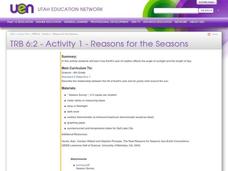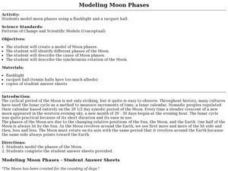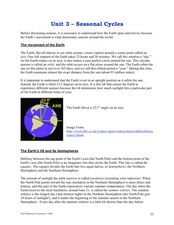Curated OER
Wobbling in Circles
Sixth graders role play the parts of the sun, the moon and the Earth as they simulate the concepts of revolution and rotation. They act out the parts in small groups and discuss the concepts as a class.
Curated OER
The Planet Earth
Students explore the planet Earth, outer space, and Earth's axis. They demonstrate reading comprehension skills, including literal meaning, inference and critical analysis.
Curated OER
Properties of Earth: Word Search
In this word search worksheet, learners search for words related to the Earth, the sun and it's movements. Terms include seasons, features, and movements.
Space Awareness
Climate Zones
The climate at the equator is hotter than the climate at the poles, but why? The lesson goes in depth, explaining how the angles of illumination relate to the heating rate at different latitudes and seasons. Scholars use a strong lamp,...
Curated OER
Earth and Seasons
Sixth graders comprehend that the path Earth takes as it revolves around the sun is called its orbit. They also comprehend that the axis is an imaginary line that passes through Earth's center and its North and South Poles. Students...
Curated OER
How Big Are Earth, Sun, and Moon?
Third graders draw what they believe is in space on a dry erase board. In groups, they are given a beaker half filled with water and they add a teaspoon of oil, observing the different layers that form. To end the lesson, they identify...
Curated OER
The Earth's Atmosphere and Temperature
Students describe and compare the layers of the atmosphere. They explain how to measure the temperature of the atmosphere and discover what causes the atmosphere to heat up in some places more than in others.
Space Awareness
Making A Sundial
Can people really measure time just by using the sun? Scholars venture outside on a nice, sunny day to build sundials and learn how people measured time 600 years ago. The class builds two different sundials while gaining practice with...
Curated OER
Reasons for the Seasons
Sixth graders conduct and analyze a survey that explores public perceptions about the reasons for seasonal change. They measure the changing length of days, observe shadows and discuss how the Earth's axis of rotation affects the seasons.
Curated OER
Reasons for the Seasons
Students discover how the Earth's axis of rotation affects the angle of sunlight and the length of day. They take a survey and give the survey out to family members and friends. They tally their findings and then determine the correct...
Curated OER
Day And Night
First graders examine how the earth experiences day and night by using a flashlight and a globe as a model.
Curated OER
The Night Sky
Third graders develop questions they have about the solar system. After being read a book, they view and discuss different constellations in the sky. In groups, they are given a piece of butcher paper and glow in the dark crayons in...
Curated OER
Astronomy Test
In this astronomy test, students answer 50 true/false and multiple choice questions about the relationships of the earth, moon, and sun. The test also includes questions about the solar system, galaxies, and the universe. An answer key...
University of Arizona
The Exotic Vacation
Students explain the concepts and vocabulary of Earth's rotation. They plan imaginary vacations based on the seasons in different locations. This is a very creative lesson plan, which students enjoy.
Core Knowledge Foundation
A Time for All Seasons - Winter
As the days get shorter and a chill enters the air, it's time to start teaching your little ones about the wondrous winter season. Through a series of teacher demonstrations, whole-class read alouds and discussions, and hands-on...
Curated OER
Apparent Motion of the Sun
Demonstrate the path of the sun across the sky at different times of the year with an engaging science lesson. Learners use a series of questions and diagrams to examine the movement of the sun and appearance of the sky around...
Curated OER
Shadow Trackers: From Photography to Writing
Students explore the rotation of the earth. In this science lesson, students view photos of various places around the world. Students conduct an experiment in which they can see how the earth's rotation creates shadows on the earth.
Curated OER
Motion of the Sun and Earth: Using a Playground Model to Explore Rotation and Revolution
Students experience the rotation of the Earth and the Sun and the Earth's revolution around the Sun, using a playground mode.
Curated OER
Motion of the Sun and Earth: Using a Classroom Model to Explore Rotation and Revolution
Students use a concrete model of the Sun and Earth to observe and manipulate a 3-D model of the Sun and Earth.
Curated OER
Shadow Trackers
Young scholars use online websites to inquire about the cycle of day and night. For this web based lesson, students are able to see the movement of the sun and Earth. Young scholars can look at different parts of the Earth as if they...
Curated OER
Modeling Moon Phases
Students identify the phases of the Moon and the synchronous rotation. In this hands on lesson students will create a model of the Moon.
Curated OER
Moon Phases, Day/Night
Fifth graders observe a demonstration that shows how the alignment of the sun, moon, earth relate to the phases of the moon that occur each month. They describe the moon's phases after experimenting in a small group setting and recording...
Curated OER
Seasonal cycles
Students understand that the rotation of the Earth is responsible for the seasons. In this seasonal cycles lesson, students learn how the rotation of the Earth affects the seasons. Students answer questions about the rotation, the...
Curated OER
Mississippi’s Contribution to Space Exploration
Eighth graders engage in a class discussion while going through a PowerPoint on Mississippi's contribution to space exploration. In this Space science lesson plan, the students will also participate in Brain Pop quizzes where they will...

























